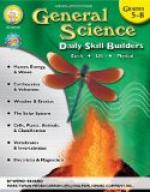Then, too, there are more uses for food than the production of heat. Teeth and bones and nails need a constant supply of mineral matter, and mineral matter is frequently found in greatest abundance in foods of low fuel value, such as lettuce, watercress, etc., though practically all foods yield at least a small mineral constituent. When fuel values alone are considered, fruits have a low value, but because of the flavor they impart to other foods, and because of the healthful influence they exercise in digestion, they cannot be excluded from the diet.
Care should be constantly exercised to provide substantial foods of high fuel value. But the nutritive foods should be wisely supplemented by such foods as fruits, whose real value is one of indirect rather then direct service.
58. Our Bodies. Somewhat as a house is composed of a group of bricks, or a sand heap of grains of sand, the human body is composed of small divisions called cells. Ordinarily we cannot see these cells because of their minuteness, but if we examine a piece of skin, or a hair of the head, or a tiny sliver of bone under the microscope, we see that each of these is composed of a group of different cells. A merchant, watchful about the fineness of the wool which he is purchasing, counts with his lens the number of threads to the inch; a physician, when he wishes, can, with the aid of the microscope, examine the cells in a muscle, or in a piece of fat, or in a nerve fiber. Not only is the human body composed of cells, but so also are the bodies of all animals from the tiny gnat which annoys us, and the fly which buzzes around us, to the mammoth creatures of the tropics. These cells do the work of the body, the bone cells build up the skeleton, the nail cells form the finger and toe nails, the lung cells take care of breathing, the muscle cells control motion, and the brain cells are responsible for thought.
59. Why we eat so Much. The cells of the body are constantly, day by day, minute by minute, breaking down and needing repair, are constantly requiring replacement by new cells, and, in the case of the child, are continually increasing in number. The repair of an ordinary machine, an engine, for example, is made at the expense of money, but the repair and replacement of our human cell machinery are accomplished at the expense of food. More than one third of all the food we eat goes to maintain the body cells, and to keep them in good order. It is for this reason that we consume a large quantity of food. If all the food we eat were utilized for energy, the housewife could cook less, and the housefather could save money on grocer’s and butcher’s bills. If you put a ton of coal in an engine, its available energy is used to run the engine, but if the engine were like the human body, one third of the ton would be used up by the engine in keeping walls, shafts, wheels, belts, etc., in order, and only two thirds would go towards running the engine. When an engine is not working, fuel is not consumed, but the body requires food for mere existence, regardless of whether it does active work or not. When we work, the cells break down more quickly, and the repair is greater than when we are at rest, and hence there is need of a larger amount of food; but whether we work or not, food is necessary.




